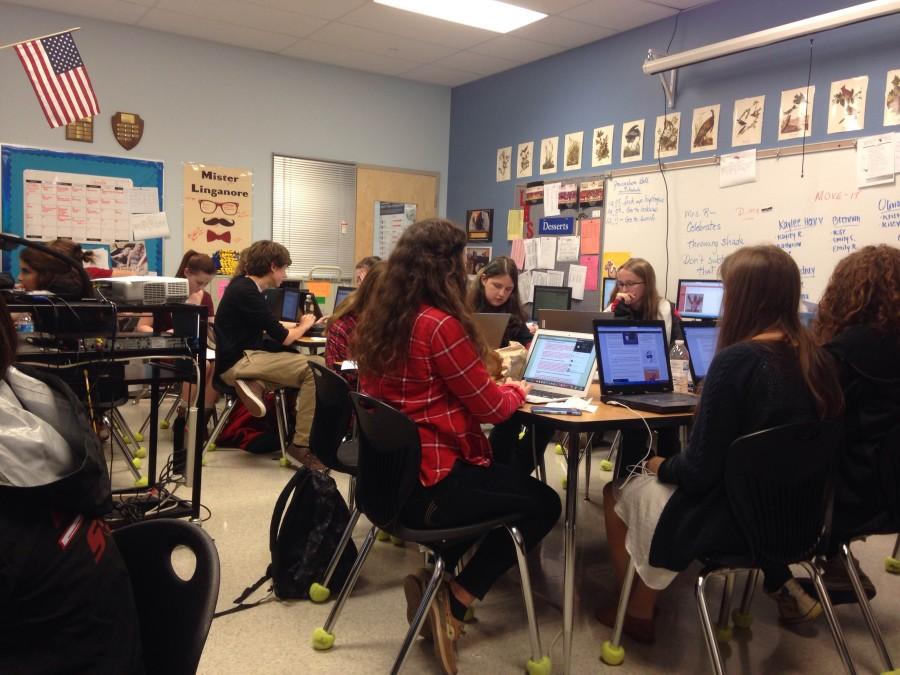Should internet access be a human right?
Rebetsky’s third period Journalism class uses laptops and computers every day. Without access, they cannot produce the school newspaper.
November 23, 2015
Could you go a day without the internet? An info-graphic from Host Gator, a site that sells licences to host websites, states that there are over 2 billion worldwide internet users, and 70% use the internet every day. Over one third of the world’s population uses the internet.
Many believe that access to the internet should be guaranteed for all, like food and shelter, because it’s critical for survival in the modern world.
“It is so important for information and ideas to flow freely over the internet and through the media. My husband and I are on the receiving end of plenty of questioning and criticism from our media and our fellow citizens, and it’s not always easy. But I wouldn’t trade it for anything in the world. When it comes to expressing yourself freely, and worshiping as you choose, and having open access to information – we believe those are universal rights that are the birthright of every person on this planet,” said First Lady Michelle Obama in a speech at the Stanford Center at Peking University. Risking upsetting China, her goal was to highlight the importance of unrestricted access.
Recently, the Obama Administration announced a new pilot Housing and Urban Development (HUD) program called ConnectHome. It expands broadband access to low-income households.
Nearly every single family that has taken a part in another established program, Internet Essentials, a Comcast program for low-income families, says it has and influence on improving their children’s grades. Internet Essentials is only available to new XFINITY Internet customers who have at least one child who is eligible to participate in the National School Lunch Program (NSLP). The cost is approximately $10.00 per month.
In most schools, the internet is part of almost every class. Students use apps such as Google Drive and Google Classroom. An article from Dallas News by Juan Andrade Jr. made a point that not all students’ families can’t afford a monthly subscription for the Internet so, students do not have the advantage their peers do in school.
A huge amount of the human population is not connected to the internet. An article from The Washington Post reports India is home to nearly a quarter of the world’s offline population.
It’s not just a third-world country problem. About 50 million people from the United States don’t use the internet because they don’t have the opportunity.
Tech coordinator Stefanie Roberts questions whether the internet should be a “human right.” She said, ” Yes, students education would be affected without Internet access. However, the students will still learn the same information but they would be taught in a different matter. You can still show videos without the Internet and teach facts with books. If a student’s education began with Internet access, then was taken away it would look like a big deficit. However, if the student’s education started without the Internet, it wouldn’t seem like a big deal not using it.”
In an article from CNS News, Michael O’Rielly a Federal Communications Commission (FCC) member also believes that, “It is important to note that Internet access is not a necessity in the day-to-day lives of Americans and doesn’t even come close to the threshold to be considered a basic human right.”
I believe their evaluation is not entirely true. Without internet access there are multiple opportunities people are kept from. To get a job, you have to fill out an online application. Almost all businesses have some connection to the internet. Banking online and paying bills online has become an essential. According to a survey from the Bank of America 90% of the people who have taken the survey use online banking. Fifty eight percent of those people have used mobile check deposit.
Education would be affected without the internet as well. Students wouldn’t be able to check their grades regularly, and teachers mostly communicate with e-mail. Teachers set up Remind 101 so they can send out texts to remind their students of up coming assignments. Without the Find Out First announcements, parents wouldn’t be able to know whether school was cancelled or not. Applying for college is done online through Naviance. Also enrolling your child into school is done online. The modern learning experience is 100% connected to the Internet.
Our lifestyles are becoming more and more reliant on the internet, and without access it makes it difficult for people to live their life efficiently.






